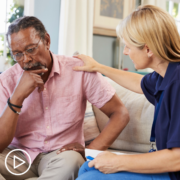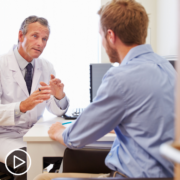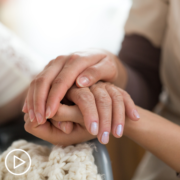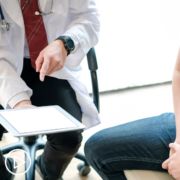What Do Prostate Cancer Patients Need to Know About COVID-19? from Patient Empowerment Network on Vimeo.
Due to COVID-19, many patients with prostate cancer must follow new guidelines to receive care. Dr. Alicia Morgans, a hematology and oncology specialist, explains precautions patients should take and the role telemedicine plays in prostate cancer care.
Dr. Alicia Morgans is an Assistant Professor of Medicine at the Robert H. Lurie Comprehensive Cancer Center of Northwestern University.
See more from The Pro-Active Prostate Cancer Patient Toolkit
Related Resources
Transcript:
Dr. Alicia Morgans:
Men with prostate cancer, like every patient with cancer, do need to take precautions because of COVID, but the degree of caution that they need to take really depends on a couple of factors. One is probably that individual’s age, with older people being more susceptible to having severe complications related to COVID, especially if they have other medical conditions like COPD or lung disease or heart disease with a history of things like heart attack or stents in the heart. Things like diabetes can even increase the risk of having complications, according to some studies, for people with cancer. So, these are things to think about. Comorbid illness and certainly advancing age.
The other thing that I always think about is what kind of therapy are you getting as a man with prostate cancer? Are you getting something that really is only affecting hormones, like lowering testosterone levels or blocking testosterone signaling? That’s the male hormone. Hormonal treatments don’t suppress a person’s immune system. So, they don’t change the way that an individual’s immune system can attack the COVID virus and protect them from that illness. And those kinds of treatments are not as dangerous to use in a pandemic like we’re experiencing now, because they don’t affect a person’s ability – their innate and normal ability – to fight off the disease.
Things like chemotherapy, on the other hand, do suppress the immune system. They make it difficult for the immune system to fight things like that SARS virus, SARS-CoV-2, that causes COVID-19, because it suppresses the immune system such that a patient can’t mount the normal response that he would have against that virus if it came into his body.
When we don’t have an immune system, we can be more susceptible to things like that SARS-CoV-2 virus that causes COVID-19, but we can be susceptible to things that we would find in our normal environment and sometimes even to infections from bacteria that live in our body all the time. So, things like chemotherapy can be challenging whenever you take them. They can be incredibly effective against cancer. And so, it’s always this trade-off.
And if it’s recommended to you, you can get it safely, but taking extra precautions with, of course, washing hands, wearing masks, but also, probably, really still socially distancing even though some of the restrictions in most of the United States have lessened. If you’re on chemotherapy, I would still recommend social distancing and staying out of public places, because you do not necessarily have the immune system that you would normally have to protect yourself from the virus.
Telemedicine has been great for men with prostate cancer when they don’t necessarily need to come in to be seen. This can be really helpful, especially between visits where people are getting injections that they get to lower testosterone as androgen deprivation therapy. If that injection is due every three months or four months, but your doctor wants to check in on you every six weeks or eight weeks, having a telemedicine visit at that interim visit can be really useful so you don’t have to come all the way into the clinic to see the provider.
They can even be useful if you do need to get the injection or you do need to get lab work, because you can get those procedures and then go home and still be safe not sitting in a waiting room, not sitting in a doctor room. And the doctor can usually call and have that telemedicine visit.
For men who have been treated and are simply having their PSA followed because they’ve had a prostate surgery or have had radiation to the prostate and are believed to be cured, as long as they can get that lab work done, the telemedicine visit gives them the opportunity to get the guidance of their doctor who has looked at their lab work, without actually going in to see that doctor in person and potentially put themselves at risk of getting an infection in the in the clinic or the hospital setting.
So, telemedicine is a way for us to really protect our patients and stay engaged while we’re not seeing them in person. But it is still important to do the telemedicine and not just say I’m not going to do anything. And it will be important at some points for many men with prostate cancer to come in at least to do lab work or to get their injections if that’s part of their treatment plan to make sure that they are still being monitored despite the pandemic.



















